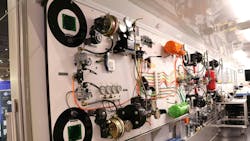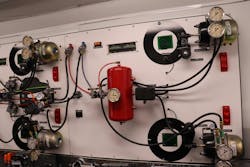Shops find physical training aids effective to upskill technicians
This is Part One of a two-part story. Read Part Two here.
Continuous education is critical for both new and experienced technicians to stay up to speed on commercial vehicle maintenance and repair, not only to shore up the fallibility of the human mind but to keep up with rapid changes in technology and regulations.
“Because of our cognitive limits, it’s important to continue to reinforce concepts, even if learners have had 40 years in the industry,” said Dr. Gina Anderson, CEO and co-founder of Luma Brighter Learning, an online fleet education company. She also noted that continuous training combats “complacency in the workplace” and prepares employees for technological and regulatory changes.
But with uptime at a premium, shops understaffed, and management resources spread thin, performing that training is easier said than done.
“The most common constraints are time, often due to heavy workload or busy schedules, and limited access to training resources or opportunities in remote areas,” said Rick Brady, Premier Transportation’s director of maintenance. “From the management side of things, financial constraints, such as lack of funding for training courses or workshops, or a lack of support and encouragement from leadership to invest time in professional development, can also be a factor.”
According to the 2023 Training Benchmarks Survey from ASE’s Training Managers Council, fleet technicians reported the greatest learning gap. Fifty-five percent of fleet techs said they didn’t have access to the training they needed, versus 46% of responding aftermarket and independent technicians and only 32% of OE technicians. The top reasons cited included the lack of right topics and time off, as well as quality and cost factors.
Overall, training sentiments have returned to pre-pandemic levels, with about 60% saying they have access to the training they need. In the nadir of 2021, less than half agreed.
But with the onset of more complex trucks on the horizon, including battery-electric and fuel-cell electric vehicles, as well as ones with post-2027 diesel engines and aftertreatment systems, all techs will need more training so they can recognize issues faster and move vehicles through the shop quicker. In the ATMC survey, 67% of respondents said they most needed training on hybrid/EV systems, 54% requested ADAS training, and 46% needed work on electrical systems.
“People are generally weak in electrical diagnostics,” said George Arrants, VP of the ASE Education Foundation. “In my 14 years chairing TMCSuper Tech, the electrical stations were the ones that technicians struggled with the most.”
Scott Meek, manager of diesel training at Diesel Laptops, said technicians also need the most continuous training with diagnostics because it touches on several systems. He noted the wide range of systems and components a tech needs to know how to troubleshoot. These include performance or drivability, electrical, emissions, HVAC, hydraulics and more. “[These] would require continued training in many categories, not just one,” he noted.
But what’s the best way to provide this training? Given that shops don’t have a lot of free time, there’s little leeway to experiment. They have to implement a training structure that works for their people right the first time. This isn’t an issue solved in one article, but here we hope to shed some light on the tools available and how they could help get your techs up to speed.
System display boards
Physical display boards offer holistic views of the increasingly complex systems found in trucks today.
Read more: Pitt Ohio pays school back with a Mack
Bendix uses such boards with their in-person training at the company’s headquarters. They depict and simulate systems such as Bendix’s Wingman Fusion, collision mitigation technology, air and pneumatic brake systems, and electrical systems. These boards, and their systems, work as if they’re connected to a truck while also showing how they interact. And they can be loaded onto trailers and sent to fleets for in-person learning.
“We can simulate an antilock braking event, and we can connect to the boards with Bendix ACom diagnostic software just like we connect to an actual vehicle,” Screeton said. “Having this all laid out for the training attendees really makes it easy to see all the components that make up the pneumatic and electrical systems of a commercial vehicle.”
Diesel Laptops offers desktop labs that can also be sent to fleets as an introduction to broad, complex topics, such as electrical systems.
“For example, for our intro to electrical course, we use labs that we build in house that will align with what was taught in the class,” Meek stated. “They are made to be used on a desktop so [technicians] can easily access the circuits and also see the path of the circuit, which makes understanding this complex topic much easier.”
For electrical systems, the lab aids outline real-life circuits including HVAC control units, starter circuits, and automated transmission wiring circuits.
Component displays
Although they don’t currently provide training to those who don’t work at Love’s locations, Love’s doesn’t just transport a single board or lab to shops for training. They have several mobile training labs outfitted with tools and components on various subjects, including wheel-end maintenance, A/C, brakes, electrical systems, air systems, diagnostics, and preventative maintenance.
“While the diesel technician training at Love’s Truck Care Academy facilities is aimed at building that knowledge foundation for troubleshooting and fixing truck issues, the benefits we see in the mobile training labs are in the retraining opportunities,” said Chuck Ralston, sr. manager of Truck Care Academy and mechanical services for Love’s. “The mobile lab has been useful in refining habits and leveling up the skillset of technicians.”
But if a full, 48’ training trailer is too much of an investment for a shop or fleet, smaller training aids are available as well, such as the Eva Electric Vehicle Training Aid from AVI. The training aid cart includes a year subscription to curriculum and physical hardware such as a reversible 3-phase motor, traction inverter, transaxle, CAN software, a gel-cell 12V battery, and more.
Singular components can serve as strong training aids too, and can be more cost-effective than an entire kit.
“Location managers can proactively engage with local vendors and suppliers to arrange on-site training sessions,” explained Joe Vatalaro, PacLease director of maintenance. “For instance, your fifth wheel supplier can provide fifth wheel training on a stand, enabling technicians to learn proper servicing, repair, and rebuilding techniques specific to your fifth wheel.”
With these options in mind, shops have more opportunities to work training into their busy schedules, keeping both their techs and vehicles up to speed.
For more information on the digital training tools available for techs, see part two of this story when it becomes available.
About the Author

Alex Keenan
Alex Keenan is an Associate Editor for Fleet Maintenance magazine. She has written on a variety of topics for the past several years and recently joined the transportation industry, reviewing content covering technician challenges and breaking industry news. She holds a bachelor's degree in English from Colorado State University in Fort Collins, Colorado.

